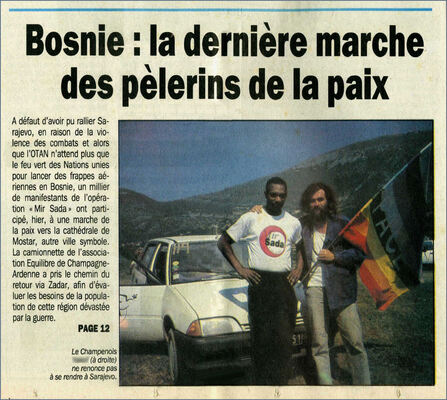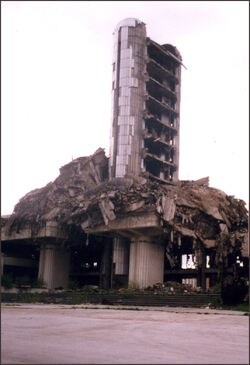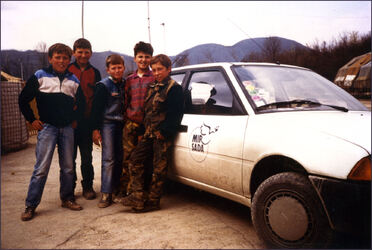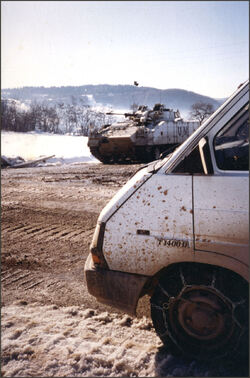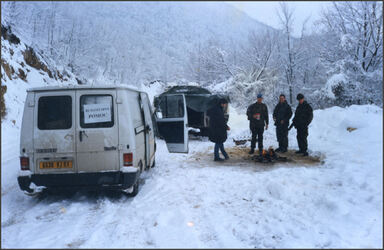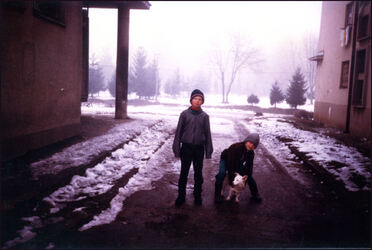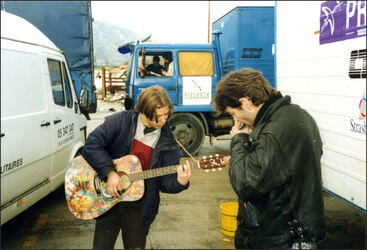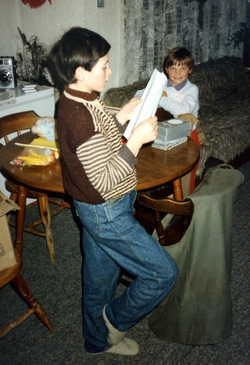-
Par Peace Lines le 19 Août 2015 à 22:02
* See translation of this article by Isabelle Horlans (photo credit), in the French daily L'Union (August 8, 1993) below : "Bosnie : the last march of the peace pilgrims"
In the beginning, in the spring of 1993, there was an article by a French war reporter, Jean-Paul Mari, who informed his readers that in besieged Sarajevo, Bosnia, there was a man, Zlatko Dizdarevic, with a team of journalists, living and working underground, in the caves of their Oslobodenje headquarters, as the tower with its offices had been reduced to rubble by enemy artillery.
There also was a convoy of people from many nations (France, Poland, Italy, Greece, Spain, Belgium, the Netherlands, Sweden, the United States...), in the summer of 1993, gathered under the motto "MIR SADA" ("PEACE NOW"), who had pledged itself to break the siege of Sarajevo. Two thousand of these "peace pilgrims" made it to Split, on the Dalmatian Coast, with trucks, buses and cars. Half of those reached the first front lines, on the shore of Lake Prozor in Middle Bosnia, in 120 cars and buses. Of these thousand, only sixty drove all the way, through front lines and check-points, to Sarajevo, in one Italian bus and less than 10 cars. The result was a de facto cease-fire, and for some time it looked like something was happening in Sarajevo, at last, after 15 months of siege.
We did not even have maps of the former-Yugoslavia... We did not have a truck or a van... There was no Peace Lines then. Needless to say, we were penniless, and knew there would be no gas stations in war zones... We only knew that we had to go back, that Bosnia was staring at us, and that we just could not turn a deaf ear to it. We started from scratch, had to go begging around until we found a benevolent used cars salesman, in his little wooden cabin, who first entrusted us with one of his Renault Trafic vans. Then, we had to fill the van with boxes of food, drugs, candles, clothes, blankets, lots of books too, since we had heard Sarajevo's mayor, Muhamed Kreševljaković, warn us that, despite the hardships of the siege, they were sick and tired of being treated like "mere digestive systems". The other dire warning he gave us concerned the fact that only 5% of humanitarian help ever reached his citizens. The rest was swindled away by militias and the usual war profiteers. Part of our relief, at the end of our 20 some convoys, was that we never lost one box or one kilo of anything to these budala (traffickers in Bosnian), thugs.
From the Dalmatian Coast to Sarajevo, you had around 60 check-points, and just one track through the mountains to connect the capital of Bosnia to the rest of the world : the Diamond Road. It had been named thus by the British of the United Nations Protection Force who controlled this part of Bosnia.
On the other side of the mountain, you had the burning city of Gornji-Vakuf, and yet another mountain to climb, until you reached the Lashva Valley, with more towns under fire, starting with Novi-Travnik and Vitez. Maybe Vitez was the strangest of all, since in the heart of it you found Stari-Vitez, a Muslim section, besieged by the rest of Vitez (Croats), themselves under attack from the Muslim Armija from Zenica, with their dreaded auxiliaries, the mudjahideen, Muslim volunteers who had come by the hundreds from as far as... Afghanistan (it is said that Bin Laden was there and got himself a Bosnian passport at the time, and that Bosnia was Al Qaida's training field in Europe - cf. Unholy terror, by John R. Schindler, Zenith Press, 2007, pp. 123-124).
To us, this was never about new borders, new flags, and ancient grudges. Instead, it was all about the fate of people, and kids foremost, who got caught under the compelling spell of granata, mortar shells, and snipers' bullets, that were the prevailing type of weather we had in those days. The boy on the third picture is the last victim of the war between Croats and Bosniaks in Middle Bosnia. He was only 10, playing with his two friends and the dog before their home, in Vitez. The granata that killed him, in February 1994, was fired from Stari-Vitez, a few hundred yards away. On the second picture, you see the impact of such a granata. What difference does it make, now, that he was a Croat, or a Bosniak, or a Serb ?
We had to think twice, we had to think hard. What was it we could really do, to be on the side of the U.N. Protection Force, with those who really tried to stop this madness of butchering human beings in the name of new nations, of die-hard nationalism. Too often in the name of personal profit, whether you call it obvious looting or war-profiteering ? One van held no more than a ton and a half of whatever. It was no rocket science to find out that, even with a dozen trucks like our better-equipped Alsatian friends from the n.g.o. Presence (picture on the left above) conveying 100 tons each time, it was like a few drops of relief in an ocean of pain.
100,000 kilos of food, say, for 100,000 people in the Southern city of Mostar - if you ever could distribute equally to each and all - would only amount to 1 kilo per person and per trip. We had to search upstream for the sources of the conflict. As we came to understand the culture of the pre-warring factions, among the younger generations, was more or less the same, one thing we did was to record hundreds of cassette tapes with all the anti-war songs we could think of. This was always a great success at check-points. Instead of cartons of cigarettes or bottles of hard liquor, we'd pay them with songs. One of the most mind-blowing scenes happened on the Vrbanja Bridge in Sarajevo, in 1995, when the Bosnian soldiers started dancing to one of our most popular songs. We were surrounded by loaded guns, and people half-willing to use them, depending upon the hour of day and their state of intoxication, but the victory of the guitar over the gun was still quite dubious.
As songs come and go, we came up with the idea that texts were needed, something more solid, to remind each and every fighter of what it was all about, pre-war, when they were farmers, teachers, employees, students... We did write to a few people for authorizations, and met with Martin Gray, the Warsaw Ghetto survivor, in the home where he had survived the lethal flames of a wild bush fire in the South of France (cf. his best-seller For Those I loved). Martin gave us such a warm welcome, and it was clear that much of our inspiration came from his own struggle as a teenager in Warsaw, how he crossed the lines, and went through barriers and obstacles.
It was then we got down to serious business : duplicating, translating into Serbo-Croat the most relevant extracts from him, Henry David Thoreau, Voltaire, La Boétie, Giono, Khalil Gibran, Richard Bach, Saint-Exupéry, Walt Whitman, Plato, Gandhi, Martin Luther King, Thich Nhat Hanh, Brassens, Ferré... We brought those booklets through the check-points, distributed them widely, everywhere we went. What a scene it was to hear a ten-year old reading these words of Jean Giono out loud to his younger sister and family ! "Kada neko nema dovoljno hrabosti..." : "When one does not have the courage to be a peace maker, one is a warrior..." (picture in the middle).
* Translation of the article "Bosnia : the last march of the peace pilgrims" : "Unable to reach Sarajevo at this stage, because of the violence of the fighting, at a time when NATO is only expecting a green light from the UN to launch air strikes in Bosnia, one thousand protesters of the "Mir Sada" convoy participated yesterday in a peace march towards the Mostar Cathedral, another symbolic town. The van of the Equilibre group from Champagne-Ardenne (France) drove back home via Zadar, to assess the needs of the population in this war-stricken area."
**********************************************************************************************************************************************************************************************
OUR FIRST NOBEL CALL : 1995
the Zenica-Sarajevo Call to the fighters and leaders in former Yugoslavia
This Call, signed by 33 Nobel Laureates, European Deputees and Personnalities, was broadcast on most radios and tv stations in Bosnia, repeatedly, from April to the summer of 1995, on the three sides : Bosnians, Croats, and Serbs (NTV Zetel in Zenica, Studio 99 in Sarajevo, Kis-TV in Kiseljak, the two radios of Mostar, TV-Pale).
ENOUGH ! Enough blood ! Enough speeches ! Enough alibis !
The balance of this war, who can draw it up ?
Who can tell others about the loss of a brother, of a son, of a wife ?
War always took frightfully more than it gave.
Strategic, territorial games have led to terror,
To amputations, to the toothless grimaces of the after-war times.
After war, we know there is no promised land.
After war, those only who have lost all pay the price
of nightmares, of general carelessness, of back to normal loneliness.
After war, there are no heroes left, no just causes.
There are only cripples left, and disfigured faces,
Among the ruins, and the earth graves into lines.
Because we want the stench of war no more,
Because we all know there is no military solution,
We call for a powerful movement of peace and reconciliation
For a final cease-fire on all the territory of former Yugoslavia
We must finally have the courage and sanity to say it is ENOUGH
We must prevent any more massacres !
Not one more bullet, not one more shell, nevermore !Martin Luther King's widow - Coretta Scott King (USA, 1964)
Mairead Maguire (Ireland, 1976)
Betty Williams (Ireland, 1976)
Mother Teresa (Albania, 1979)
Adolfo Perez Esquivel (Argentina, 1980)
Reverend Desmond Tutu (South-Africa, 1984)
Elie Wiesel (Romania, 1986)
the 14th Dalai Lama (Tibet, 1989)
Pdt Mikhail Gorbachev (Russia, 1990)
Rigoberta Menchu (Guatemala, 1992)
Pdt F.W. de Klerk (South-Africa, 1993)
Pdt Yaser Arafat (Egypt, 1994)
PM Yitzhak Rabin (Israel, 1994)7 Nobel Chemistry Laureates
Max Perutz (Austria, 1962)
Vladimir Prelog (Bosnia, 1975)
Sir John W. Cornforth (Great-Britain, 1975)
Henry Taube (Canada, 1983)
Jean-Marie Lehn (France, 1987)
Robert Huber (Germany, 1988)
Elias Corey (USA, 1990)6 Nobel Medicine Laureates
François Jacob (France, 1965)
Jean Dausset (France, 1980)
Cesar Milstein (Argentina, 1984)
Stanley Cohen (USA, 1986)
Rita Levi-Montalcini (Italy, 1986)
Erwin Neher (Germany, 1991)7 Nobel Physics Laureates
Louis Néel (France, 1970)
Nicolaas Bloembergen (the Netherlands, 1981)
Simon van der Meer (Switzerland, 1984)
Heinrich Rohrer (Switzerland, 1986)
Georg Bednorz (Germany, 1987)
Alexander Müller (Switzerland, 1987)
Jack Steinberger (Germany, 1988)Non-Nobel Personalities : Joan Baez (USA), Tony Benn (G-B, MP), Dalil Boubakeur (Algeria-France), Martin Gray (Poland), Henri Laborit (France), Jules Roy (France)
Members of the European Parliament : Dominique Baudis (France), Philippe Herzog (France), Alexander Langer (Italy); Mireille Elmalan (France), Nana Mouskouri (Greece)
 votre commentaire
votre commentaire
